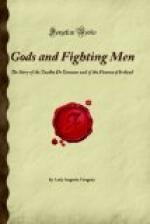Book VIII. Cnoc-an-Air
Chap. I. Tailc, Son of
Treon
II. Meargach’s Wife
III. Ailne’s Revenge
Book IX. The Wearing Away of the Fianna
Chap. I. The Quarrel with
the Sons of Morna
II. Death of Goll
III. The Battle of Gabhra
Book X. The End of the Fianna
Chap. I. Death of Bran
II. The Call of Oisin
III. The Last of the Great Men
Book XI. Oisin and Patrick
Chap. I. Oisin’s
Story
II. Oisin in Patrick’s House
III. The Arguments
IV. Oisin’s Laments
GODS AND FIGHTING MEN.
PART ONE: THE GODS.
BOOK ONE: THE COMING OF THE TUATHA DE DANAAN.
CHAPTER I. THE FIGHT WITH THE FIRBOLGS
It was in a mist the Tuatha de Danaan, the people of the gods of Dana, or as some called them, the Men of Dea, came through the air and the high air to Ireland.
It was from the north they came; and in the place they came from they had four cities, where they fought their battle for learning: great Falias, and shining Gorias, and Finias, and rich Murias that lay to the south. And in those cities they had four wise men to teach their young men skill and knowledge and perfect wisdom: Senias in Murias; and Arias, the fair-haired poet, in Finias; and Urias of the noble nature in Gorias; and Morias in Falias itself. And they brought from those four cities their four treasures: a Stone of Virtue from Falias, that was called the Lia Fail, the Stone of Destiny; and from Gorias they brought a Sword; and from Finias a Spear of Victory; and from Murias the fourth treasure, the Cauldron that no company ever went away from unsatisfied.
It was Nuada was king of the Tuatha de Danaan at that time, but Manannan, son of Lir, was greater again. And of the others that were chief among them were Ogma, brother to the king, that taught them writing, and Diancecht, that understood healing, and Neit, a god of battle, and Credenus the Craftsman, and Goibniu the Smith. And the greatest among their women were Badb, a battle goddess; and Macha, whose mast-feeding was the heads of men killed in battle; and the Morrigu, the Crow of Battle; and Eire and Fodla and Banba, daughters of the Dagda, that all three gave their names to Ireland afterwards; and Eadon, the nurse of poets; and Brigit, that was a woman of poetry, and poets worshipped her, for her sway was very great and very noble. And she was a woman of healing along with that, and a woman of smith’s work, and it was she first made the whistle for calling one to another through the night. And the one side of her face was ugly, but the other side was very comely. And the meaning of her name was Breo-saighit, a fiery arrow. And among the other women there were many shadow-forms and great queens; but Dana, that was called the Mother of the Gods, was beyond them all.




